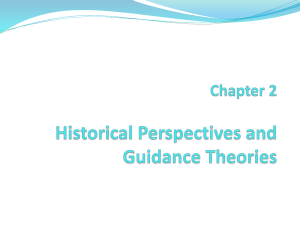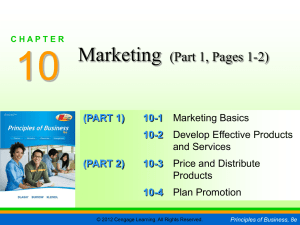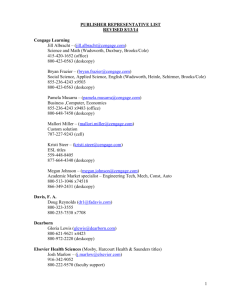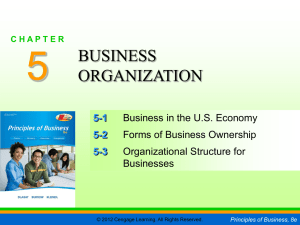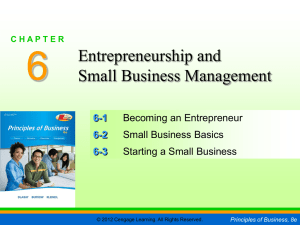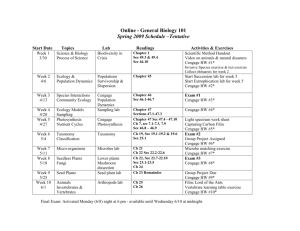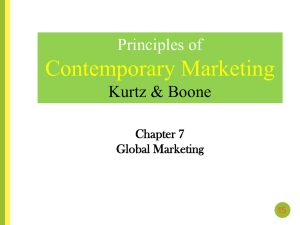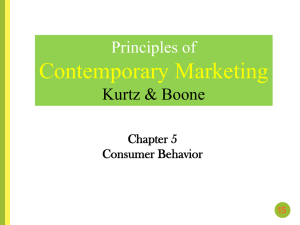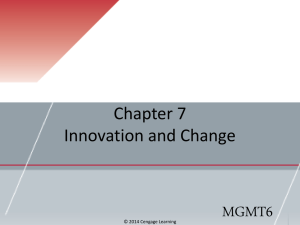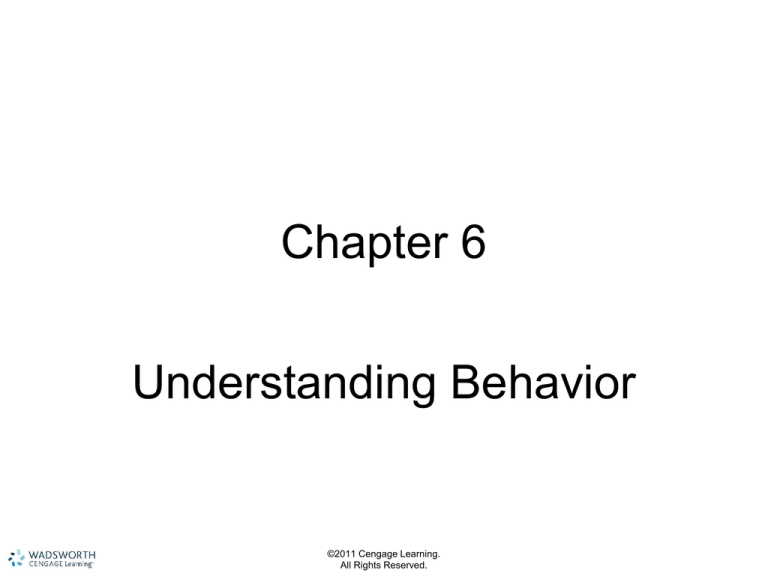
Chapter 6
Understanding Behavior
©2011 Cengage Learning.
All Rights Reserved.
Objectives
• Identify what motivates children’s actions
• Describe how children learn
• Analyze behavior using theories of child
development
• Recognize similarities and differences among
children of differing cultural backgrounds
©2011 Cengage Learning.
All Rights Reserved.
Understanding Behavior
• All behavior is meaningful to the child,
even that which an adult might call
negative.
• All behavior is reinforced by the
environment (people, places, and things)
©2011 Cengage Learning.
All Rights Reserved.
Erikson’s Theory of Psychosocial
Development
• Four stages of psychosocial development
from birth to elementary school age
– First stage task: Developing basic trust
– Second stage task: Learning autonomy and
self-discipline
– Third stage task: Developing initiative
– Fourth stage task: industry
©2011 Cengage Learning.
All Rights Reserved.
Emotional Development of Children
• Epstein (2009)
– social-emotional learning
– Emotional self-regulation and awareness
– Social knowledge and understanding
– Acquisition of social skills
– Social dispositions
©2011 Cengage Learning.
All Rights Reserved.
Emotional Development of Children
• Goleman (1995, 1997), Mayer and Salovey (1995)
– Emotional intelligence
– Self-awareness
– Self-regulation of emotion
– Self-monitoring and performance
– Empathy and perspective taking
– Social skills and handling relationships
©2011 Cengage Learning.
All Rights Reserved.
Emotional Development of Children
• Goleman continued
– Emotional skills
• Identifying and labeling feelings, expressing
feelings, assessing the intensity of feelings,
managing feelings, delaying gratification,
controlling impulses, reducing stress
– Behavioral skills
• Non-verbal communication
• Verbal communication
©2011 Cengage Learning.
All Rights Reserved.
Teacher Priorities
• Creating a secure emotional environment
• Helping children understand emotions
• Modeling genuine, appropriate emotional
responses
• Supporting children’s regulation of emotion
• Recognizing and honoring children’s
expressive styles
• Uniting children’s learning with positive
emotions
©2011 Cengage Learning.
All Rights Reserved.
Maslow’s Hierarchy of Needs
• Implications for children
• Resiliency
• Implications for teachers
• Self-respect
©2011 Cengage Learning.
All Rights Reserved.
Cultural Differences
• Avoid using stereotypes
• Remain open-minded
• Media influence
©2011 Cengage Learning.
All Rights Reserved.
Cognitive Development
• Piaget’s Theory
– Sensorimotor stage
– Preoperational stage
– Concrete operational stage
– Formal operational stage
©2011 Cengage Learning.
All Rights Reserved.
Cognitive Development
• Vygotsky’s Theory
– Private speech
– Zone of proximal development
– Scaffolding
©2011 Cengage Learning.
All Rights Reserved.
Case Studies
• Data collection
– Systematic observations
– Work samples
– Assessments and test results
– Videos, photographs, tape recordings,
dictations
– Checklists, inventories, or rating scales
– Interviews with the child or others
– Home visits and other activities
©2011 Cengage Learning.
All Rights Reserved.
Observation Forms
• Narrative
• Event Sampling
• Fixed-Interval (Time Sampling)
Observation Form
©2011 Cengage Learning.
All Rights Reserved.
Observing Play Behavior
• Parten (1932)
–
–
–
–
–
Onlooking play
Solitary play
Parallel play
Associative play
Cooperative play
• Piaget (1962)
– Symbolic play
– Practice play
– Games
©2011 Cengage Learning.
All Rights Reserved.
Roles of a Student Teacher
• Observer
• Friend to a child who needs one
• Planner (activities or lessons) and teacher
©2011 Cengage Learning.
All Rights Reserved.
Summary
• Theorists
– Erikson
– Maslow
– Goleman
– Mayer
– Salovey
– Vygotsky
• Case studies
©2011 Cengage Learning.
All Rights Reserved.

